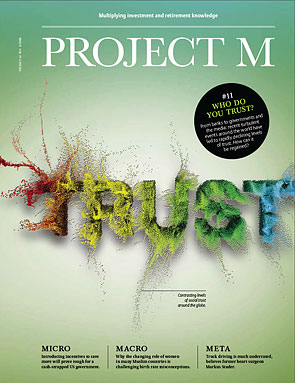Stephen Knack, a lead economist at the World Bank, once commented that, "basically all the difference between the per capita income of the United States and Somalia" could be explained by trust. These currently amount to 46,546 US dollars and 220.30 US dollars respectively (UN 2009/2010); a difference of over 46,300 US dollars and a large amount, if Knack is correct, to attribute to one five-lettered word.
Other economists prefer "trust" not even enter such calculations. For example, Oliver E. Williamson, in "Calculativeness, Trust and Economic Organization" (1992) takes exception that "trust" and "risk" are used interchangeably, arguing that it is "redundant at best and can be misleading to use the term ‘trust' to describe commercial exchange for which cost-effective safeguards have been devised in support of more efficient exchange."
He believes that when trust is justified by expectations of positive reciprocal consequences, it is simply another version of economic exchange. This he describes as "calculative trust," a contradiction in terms. The word trust, he states, should be reserved for non-calculative personal relations between family, friends and lovers.
Should the elusive notion of trust be so restrictively defined? Discussing his US/Somalia comparison, Stephen Knack says he had a broad notion in mind. This is one where, for example, two partners confidently move ahead with business plans, not necessarily because of their personal relationship, but because they operate in a country where the legal system and social relationships provide trust and stability.
"If you define trust in this manner, it is clear that it is a major determinant of economic success," he explains. In a series of papers in the late 1990s with Philip Keefer, and later Paul Zak, Knack investigated the economic payoff of social capital, the reasons why poor countries don't seem to catch up and the relationship of trust and growth.
"We make it clear that we don't define trust, like others try to do, as independent from formal institutions. For us, there is no way to separate them. There are quite a few studies published in the legal and social science journals suggesting there is a strong interplay between law and social norms. Social norms develop as they do partly because of the legal system in which they exist. Trust is something that comes from legal systems, social relationships and the interactions between the two," Knack explains.
"Does Social Capital Have an Economic Payoff" (1997 with Keefer) outlines the benefits of trust. Individuals in higher-trust societies spend less protecting themselves from being exploited in economic transactions. Litigation may be less frequent, fewer resources need to be diverted to protecting themselves (through security of person and goods or in bribes) and government officials may be perceived as more trustworthy.
Low-trust environments can discourage innovation as entrepreneurs devote more time to monitoring possible malfeasance by partners, employees and suppliers, so have less time to innovate. In "Why Don't Poor Countries Catch Up" (1998) they also note that deficiencies in the institutional environment (the legal, political and regulatory framework) may reduce investment and the ability of countries to absorb technological advances from abroad. Without these advances, countries may grow more slowly.
"I think that until investors can be confident that the government will not expropriate their assets or other individuals are not going to cheat them it really is impossible to have a modern economy," he concludes. "So, from this perspective trust is crucial. Without trust, people's per capita incomes today would only be a tiny fraction of what they actually are."

